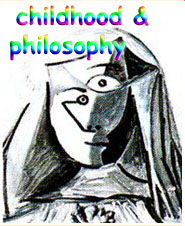making a circle: building a community of philosophical enquiry in a post-apartheid, government school in south africa
DOI:
https://doi.org/10.12957/childphilo.2019.42414Keywords:
Community of enquiry, philosophy with children, posthumanism, circleAbstract
In this paper I attempt to trace an entanglement of an event documented in my PhD research which contests dominant modes of enquiry. It is experimental research which resists the human subject as the most important aspect of research, the only one with agency or intentionality. In particular, I analyse the process of the making of the circle, and how integral it is in contributing to building the Community of Enquiry, the pedagogy of Philosophy with Children. I offer a critical posthuman analysis which engages with the material-discursive entanglements of the making of the circle. I move beyond the linguistic turn by paying attention to the intra-actions in between human and more-than-human, place, the circle and the chairs. I show how the mainly authoritarian adult-child relationships prevalent in most South African schools, can be disrupted through this pedagogical approach. This research takes place with a group of Grade 2 learners in a government school in South Africa.
References
References:
Barad, K. (2007). Meeting the universe halfway: quantum physics and the entanglement of matter and meaning. Durham: Duke University Press.
Barad, K. (2017). Troubling time/s and ecologies of nothingness: re-turning, re-membering, and facing the incalculable. In New Formations: A Journal of Culture/Theory/Politics (92) 56-86.
Baumfield, VM. (2017). Changing minds: the professional learning of teachers in a classroom community of inquiry. In Rollins
Gregory, M., Haynes, J. and Murris, K. (Eds.) The routledge international handbook of philosophy for children. London: Routledge.119-128.
Bozalek, V. (2004). Recognition, resources, responsibilities: using students’ stories of family to renew the South African social work curriculum: PhD Thesis. Utrecht.
Braidotti, R. (2018). A theoretical framework for the critical posthumanities. Theory, Culture & Society. 0(0):1-31
Ceder, S. (2016). Cutting through water: towards a posthuman theory of educational relationality. Doctoral dissertation. Faculty of Social Sciences, Lund University, Sweden. Available: https://portal.research.lu.se/ws/files/6008016/8411680.pdf [ 6 August 2016].
Christie, P. (1990). The right to learn. Johannesburg: Ravan Press
Department of Education (2001). Education White Paper 6. Special needs education. building an inclusive education and training system. Pretoria: Department of Education.
Dolphijn, R & van der Tuin, I. (2012). New materialism: interviews & cartographies. Open Humanities Press: Michigan Publishing.
D’Olimpio, L. & Teschers, C. (2017). Drama, gestures and philosophy in the classroom: playing with philosophy to support an education for life. In Rollins Gregory, M., Haynes, J. and Murris, K. (Eds.) The Routledge international handbook of philosophy for children. London: Routledge.145-152.
Echeverria, E. & Hannam, P. (2017). The community of philosophical inquiry: a pedagogical proposal for advancing democracy. In Rollins Gregory, M., Haynes, J. and Murris, K. (Eds.) The Routledge international handbook of philosophy for children. London: Routledge. 3-10.
Glaser, J. & Rollins Gregory, M. (2017). Education, identity construction and cultural renewal: the case of philosophical inquiry with Jewish bible. In Rollins Gregory, M., Haynes, J. and Murris, K. (Eds.) The Routledge international handbook of philosophy for children. London: Routledge. 180-188.
Haraway, D. (2016). Staying with the trouble: making kin in the chthulucene. Durham: Duke University Press.
Haynes, J. & Kohan, W.O. (2018). Facilitating and difficultating: the cultivation of teacher ignorance and inventiveness. In Murris, K and Haynes, J. (Eds.) Literacies, literature and learning: reading classrooms differently. London: Routledge. 204-221.
Ingold, T. (2007). Lines: a brief history. London: Routledge.
Kennedy, D. (2012). Rhizomatic curriculum development in community of philosophical inquiry . In Santi, M and Oliverio, S. (Eds) Educating for complex thinking through philosophical inquiry: models, advances, and proposals for the new millennium. Napoli: Liguori.
Kohan, W.O. (2014). Philosophy and childhood: critical perspectives and affirmative practices. New York: Palgrave Macmillan.
Lipman, M. (2003). Thinking in education. Cambridge: Cambridge University Press. 2nd Ed.
Mendonça, D. & Costa Carvalho, M. (2017). Thinking as a community: reasonableness and emotions. In Rollins Gregory, M.,
Haynes, J. and Murris, K. (Eds.) The Routledge international handbook of philosophy for children. London: Routledge. 127-134.
Murris, K. 2016. The posthuman child: educational transformation through philosophy with picturebooks. Contesting Early Childhood Series. London: Routledge
Murris, K., Crowther, J and Stanley, S. (2018). Digging and diving for treasure: erasures, silences and secrets. In Murris, K and
Haynes, J. (Eds.) Literacies, literature and learning: reading classrooms differently. London: Routledge. 149-172.
Murris, K. & Haynes, J. (2018). Philosophical playthinking in a South African literacy ‘classroom’ In Murris, K and Haynes, J. (Eds.) Literacies, literature and learning: reading classrooms differently. London: Routledge. 3-24.
Reynolds, R. (2013). Shifting family bilingualism: two South African case studies. Unpublished Masters Dissertation. University of Cape Town.
Reynolds, R & Peers, J. (2018). Chairs and questions at work in literacies. In Murris, K and Haynes, J. (Eds.) Literacies, literature and learning: reading classrooms differently. London: Routledge. 129-148.
Rose, D. B. (2017). Shimmer: when all you love is being trashed. In Tsing, A., Swanson, H., Gan, E. & Bubandt, N. (Eds.) Arts of living on a damaged planet. Minnesota: University of Minnesota Press. G 51- G 63.
Stanley, S. & Lyle, S. (2017). Philosophical play in the early years classroom. In Rollins Gregory, M., Haynes, J. and Murris, K. (Eds.) The Routledge international handbook of philosophy for children. London: Routledge. 53-61.
Strong Makaiau, A. (2017). A citizen’s education: the philosophy for children Hawai’i approach to deliberate pedagogy. In Rollins Gregory, M., Haynes, J. and Murris, K. (Eds.) The Routledge international handbook of philosophy for children. London: Routledge. 19-26.
Strong Makaiau, A., Ching-Sze Wang, J., Ragoonaden, K. & Leng, L. (2017). Empowering global p4c research and practice through self-study: the philosophy for children Hawai’i international journaling and self-study project. In Rollins Gregory, M., Haynes, J. and
Murris, K. (Eds.) The Routledge international handbook of philosophy for children. London: Routledge. 227-235.
Swanson, H., Tsing, A., Bubandt, N. & Gan, E. (2017). Introduction: bodies tumbled into bodies. In Tsing, A., Swanson, H., Gan, E. & Bubandt, N. (Eds.) Arts of living on a damaged planet. Minnesota: University of Minnesota Press.




